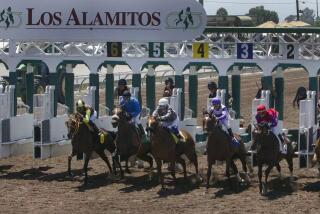U.S. Completes Roundup of Shoshone Pair’s Horses
- Share via
RENO — The Bureau of Land Management has completed its latest roundup of hundreds of horses belonging to two Western Shoshone sisters in northeastern Nevada, a spokeswoman for the sisters said Wednesday.
“It was a long, long haul. We thought they’d never leave,” said Julie Fishel, spokeswoman for Mary and Carrie Dann.
Many of the horses remain corralled at the Dann’s Crescent Valley ranch while state officials await results of required tests before the animals can be shipped out of state.
“It could go very fast or it could be a long, protracted process,” said state brand inspector Jim Connelley.
Ultimately, many of the horses are destined for California, where rancher Slick Gardner has offered them sanctuary at his spread in Buellton, a town northwest of Santa Barbara.
The Danns signed over ownership of the horses to Gardner as they were gathered by the bureau. He has said the horses will not be sold for slaughter.
The agency said 534 horses belonging to the Danns were taken off the range in the roundup that began Feb. 6 and ended Tuesday afternoon.
“The two main reasons we decided to end the gather at this time are the cost efficiencies of continuing to use a helicopter to bring in dwindling numbers of horses and the increasing potential to compromise the health of the remaining horses, which are in poor condition,” said Bob Abbey, state BLM director.
The agency maintains that the Danns have been grazing hundreds of cattle and horses illegally for decades, to the detriment of the range and other ranchers who have permits to graze livestock in the region.
In September, the agency seized and sold 227 head of cattle belonging to the elderly grandmothers. “About 95% of the cattle and horses the Danns had on the allotment in trespass are now off the range,” said Helen Hankins, agency field manager in Elko.
The Danns contend that the land still belongs to the Shoshone tribe under the 1863 Treaty of Ruby Valley and that the federal agency has no authority to regulate their grazing practices.
More to Read
Sign up for Essential California
The most important California stories and recommendations in your inbox every morning.
You may occasionally receive promotional content from the Los Angeles Times.













